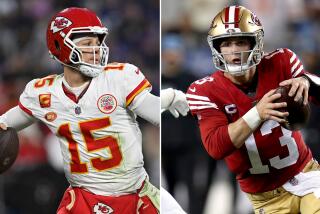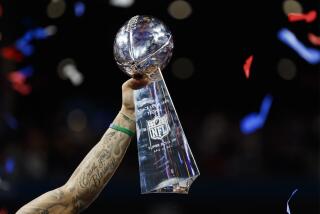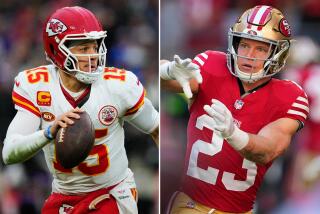Stat Guru Dissects Super Bowl
Psst, hey, buddy, looking for a Super Bowl tip? Want the inside scoop on today’s game?
Stop chuckling. I know you think you’ve seen and heard it all this week.
I know you’ve seen so much of John Elway’s smiling face that you’re ready to sack him yourself. I know you’re bored to tears already listening to what this win would mean to Jack Kent Cooke, to what Dexter Manley is going to do to the first orange jersey he finds in his face, to what it’s going to feel like for Jay Schroeder to stand around Sunday with a clipboard in his hands instead of a football.
I know that even without Jimmy the Greek around this game already has been analyzed more than a Reagan-Gorbachev summit. The Wall Street crash did not generate as many charts, graphs and serious prognosticators as Sunday’s Super Bowl XXII battle between Washington and Denver.
What’s left?
Bud Goode, for starters.
Bud is a 65-year-old Studio City computer expert who spews out facts and figures the way Mike Tyson throws punches. Endlessly.
Ask Goode who is going to win Sunday and then stand back. The barrage of numbers you are about to be showered with will make you feel like you have been shipwrecked on an island for a week with Ross Porter.
Rushing yards? Passing yards? First downs? That’s for the amateur. Goode has compiled his own list of categories, as many as 38, to handicap a game like Sunday’s.
Before you scoff, however, be aware that more than half the teams in the National Football League have hired Goode, at one time or another, to apply his numerical methods to their games. He is currently employed by seven clubs. Neither Washington nor Denver are in that group, but the two previous Super Bowl winners--Chicago and the New York Giants--are.
So armed only with a notebook and pen, we approached Goode for his breakdown of Sunday’s battle and, not surprisingly, got a view of Super Bowl XXII not expressed anywhere else.
For example, the No. 1 key to the game, according to Goode, is that old statistical standard--sack yardage combined with yardage on interception returns.
Say what?
“This is the most important stat when Denver has the ball,” Goode says. “The Denver offense loses an average of 39 yards a game when you combine those two stats. That places it in the 42nd percentile among NFL teams. Now the Washington defense, in these two categories, gets 50 yards a game. That puts it in the 100th percentile, meaning it is the best in the NFL.
“That tells me that Elway is going to have to work real hard. The Broncos average 1.3 interceptions per game. That’s, of course, between one and two. A team that throws two interceptions is going to lose four out of five games.”
How about when the Redskins have the ball? Goode is glad you asked.
“The key,” he says, “is yards gained per pass attempt. Not completions but attempts with sacks counting as incomplete passes. Washington averages 6.9 yards per attempt, which puts it in the 93rd percentile. Denver gives up 5.7 yards, which puts it in the 53rd percentile. Now since both are over 50%, you subtract and get .6, which you multiply by the unit value, three and points in the winning margin in this case, which gives you roughly 2 1/2 points in the winning margin.” If you don’t understand this, the important thing is, Bud does.
Can’t you just see Dexter Manley listening to this, nodding, and then turning to his teammates and yelling, “You hear that guys? Now you know the key! The winner is going to be the team that kicks the most behinds!”
But enough of all this, Bud. When you grind out your 38 categories, draw your charts, run your computers and tally your calculations, what’s the bottom line? Who’s going to win?
“Washington by 1,” Goode says.
Can we bet on it? Not quite, Goode cautions.
“There’s a standard deviation of plus or minus seven,” Goode says. “Sixty-six percent of all games will be decided by plus or minus a touchdown. And since the line is three, this game is really a 50-50 proposition.
“To be fair with your readers, this is not something they would want to gamble on. They wouldn’t have a prayer.”
More to Read
Go beyond the scoreboard
Get the latest on L.A.'s teams in the daily Sports Report newsletter.
You may occasionally receive promotional content from the Los Angeles Times.










